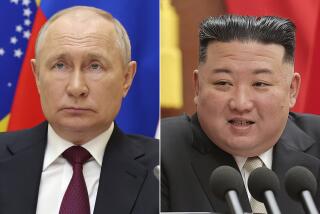U.S. pleased with results of N. Korea talks
- Share via
UNITED NATIONS — American negotiator Christopher Hill said Tuesday that two days of talks with his counterpart from North Korea had been “very good” and that the plan to dismantle the country’s nuclear program and normalize ties with the United States was “on the right track.”
Hill met with North Korean Vice Foreign Minister Kim Gye Gwan on Monday and Tuesday in New York to discuss the legal and political hurdles to establishing relations between their two countries, which have never made peace since the 1950-53 Korean War.
In eight hours of talks, including a long session over lunch at a Sichuan restaurant, officials from the two countries outlined how to carry out the steps of a landmark Feb. 13 agreement by which North Korea would scrap its nuclear weapons program in exchange for oil and possible U.S. recognition.
Hill was relaxed and upbeat at an afternoon news conference as he ticked off the agenda for the initial 60-day phase, and said the two countries would meet again in Beijing before March 19, the next session of six-party talks, which also involve Japan, South Korea, Russia and China.
“I would say there’s a sense of optimism that we’ll get through this 60-day period and achieve all our objectives,” Hill said.
Within this period, North Korea must shut down and seal the Yongbyon atomic reactor and allow U.N. nuclear inspectors to verify its dismantling. North Korea already has invited International Atomic Energy Agency chief Mohamed ElBaradei to visit next week. Once Yongbyon is shut down, North Korea is to receive emergency aid of 50,000 tons of heavy fuel oil, and a further 950,000 tons if the government in Pyongyang disables the plant.
North Korea must also provide a full disclosure of its nuclear programs, including how much plutonium the Yongbyon plant produced and how far the regime got in its uranium enrichment program. A recent U.S. intelligence report raised questions about whether the Bush administration exaggerated the extent of North Korea’s development of a uranium-based bomb.
Hill said in a morning speech at the Japan Society that North Korea “must come clean” about why it purchased massive amounts of expensive equipment to enrich uranium and that it must disclose its progress.
As North Korea acts, the U.S. will move toward removing it from a list of states that sponsor terrorism and dropping related economic sanctions.
Hill said that within 30 days, the U.S. Treasury would end its investigation of a Macao bank implicated in helping North Korea launder money, allowing it to unfreeze a portion of $24 million in suspect funds. The relatively small amount of money frozen at Banco Delta Asia by the U.S. in September 2005 has been a large symbolic obstacle to accord for North Korea, and permitting its release is a relatively easy gesture for Washington, a U.S. official said.
But Hill cautioned that the next phases of the agreement would be harder. “This process that we’re on is not unlike a videogame; it gets more and more difficult as you go on to more and more levels,” he said.
One of the trickier areas for North Korea will be to rebuild ties with Japan and address its own abductions of Japanese citizens during the 1970s and 1980s to help teach North Koreans to spy on Japan, an issue that has been Tokyo’s primary concern.
Hill said he urged Pyongyang to reach out to Japan, and he was “pleased to see there was an understanding of this central point.” He also said that he and the North Koreans discussed a final peace agreement to replace the armistice that ended the Korean War. Technically, North Korea and the U.S. are belligerents.
Hill defended the Bush administration’s participation in the February accord, acknowledging broad criticism that the pact was no better than the 1994 Agreed Framework under President Bill Clinton that North Korea broke and the current President Bush deemed a mistake. John R. Bolton, the former U.S. ambassador to the U.N., has criticized the agreement for rewarding Pyongyang before it dismantles its nuclear weapons program.
“I know there are skeptics out there,” Hill said. “But we have very, very tight deadlines, short time spans and six parties who, for now, all want to get this done.”
More to Read
Sign up for Essential California
The most important California stories and recommendations in your inbox every morning.
You may occasionally receive promotional content from the Los Angeles Times.










